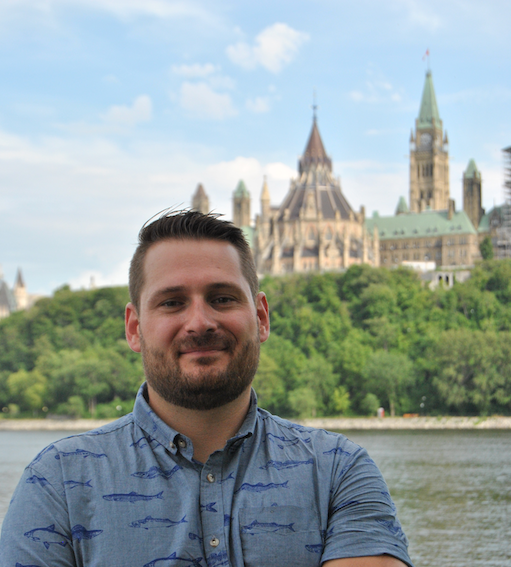By SORTEE | January 10, 2022
[SORTEE member voices is a weekly Q&A with a different SORTEE member]
Name: Andrew Kadykalo.
Date: 03 July 2021.
Position: PhD candidate.
Research and/or work interests: Andrew Kadykalo is a PhD Candidate in the department of Department of Biology and Institute of Environmental and Interdisciplinary Science at Carleton University, Ottawa, Canada. He is also a research associate at the Canadian Centre for Evidence-Based Conservation and Environmental Management (CEBCEM). He is an interdisciplinary conservation scientist who applies natural and social science tools, including policy-relevant systematic evidence syntheses, interviews, and cognitive mapping to explore relationships between people and nature. His research interests focus on predicting the delivery of regulating ecosystem services (e.g. pollination, flood regulation), and the use of evidence in wildlife management and biodiversity conservation. He is a Research Impact Canada (RIC) engaged scholar, A Community on Ecosystem Services (ACES) fellow, Natural Sciences and Engineering Research Council of Canada (NSERC) fellow in wildlife management, and is engaged in Intergovernmental Science-Policy Platform on Biodiversity and Ecosystem Services (IPBES) functions as an early career researcher..
What ‘ORT’ practice have you introduced into your research practice that you’ve found really helpful?
I recently started depositing my qualitative data onto an open source data portal repository. I use my institution’s: Carleton University Dataverse. This has become really helpful for my evidence synthesis projects where before I would store data locally and on hard drives and if someone requested it, it would take quite a bit of time to locate and refresh myself on the data. Now, with the data repository it’s all freely available to anyone that would like to see it and use it and forces (In a good way!) me to organize it in a user-friendly format, that has clear meta-data and non-proprietary accessible files. I hope this becomes the norm in evidence synthesis work in ecology and evolution.
If you had the power to change one thing about current incentives in your career path, what would it be?
Following from my previous response, one thing I would love to see is journal’s across the board implement policies for primary research articles to ensure that when they report statistical information that it is standardized so that it can be used secondarily in evidence synthesis. Thus, if the data is not reported in the main text, it should be available as supplementary information. Authors should then be required to provide sufficient statistical information such as mean, standard deviation or some estimate of precision and sample size for the various groups or other forms of clearly specific effect sizes.
Where were you born and raised?
I was born and raised in Oshawa, Ontario, Canada.
What’s the last book that affected the way you currently think about things?
I often think about the book ‘Collapse’ by Jarred Diamond in my work. Many of the environmental problems he lists troubling past societies are ones we face today. Some of the theories in his book have been rebutted, but one concept I find extremely valuable is the idea of ‘creeping normality’ where major changes are accepted as normal when they in fact occur slowly through minor, often unnoticeable, increments. This is a very important concept for the socio-ecological crises we face today: biodiversity loss, land use change, climate change, the COVID-19 pandemic.
Where is someplace you’ve never visited but would like to? Why do you want to visit there? I’d love to visit Greenland. A landscape rather bare of humans and a place I’d imagine is as close to true nature you could get to with somewhat relative ease.
Tell us about one of your hobbies. I love downhill mountain-biking which is a new hobby. The adrenaline rush is thrilling and being in a forest amongst the trees is calming. I just cracked some ribs after going over the handlebars but that risk comes with the thrill. It’s so exciting to see improvements in my riding every time I go out.
What is something about you that your scientist colleagues might find surprising? I like heavy metal music and used to play guitar in a heavy metal band. Most people think because I’m in science that I’m a nerd. Which is partly true. But outside of the university don’t be surprised to find me in a mosh pit.
Where to find you online?:
Website: www.andrewaKadykalo.com
Twitter: @andykadykalo


